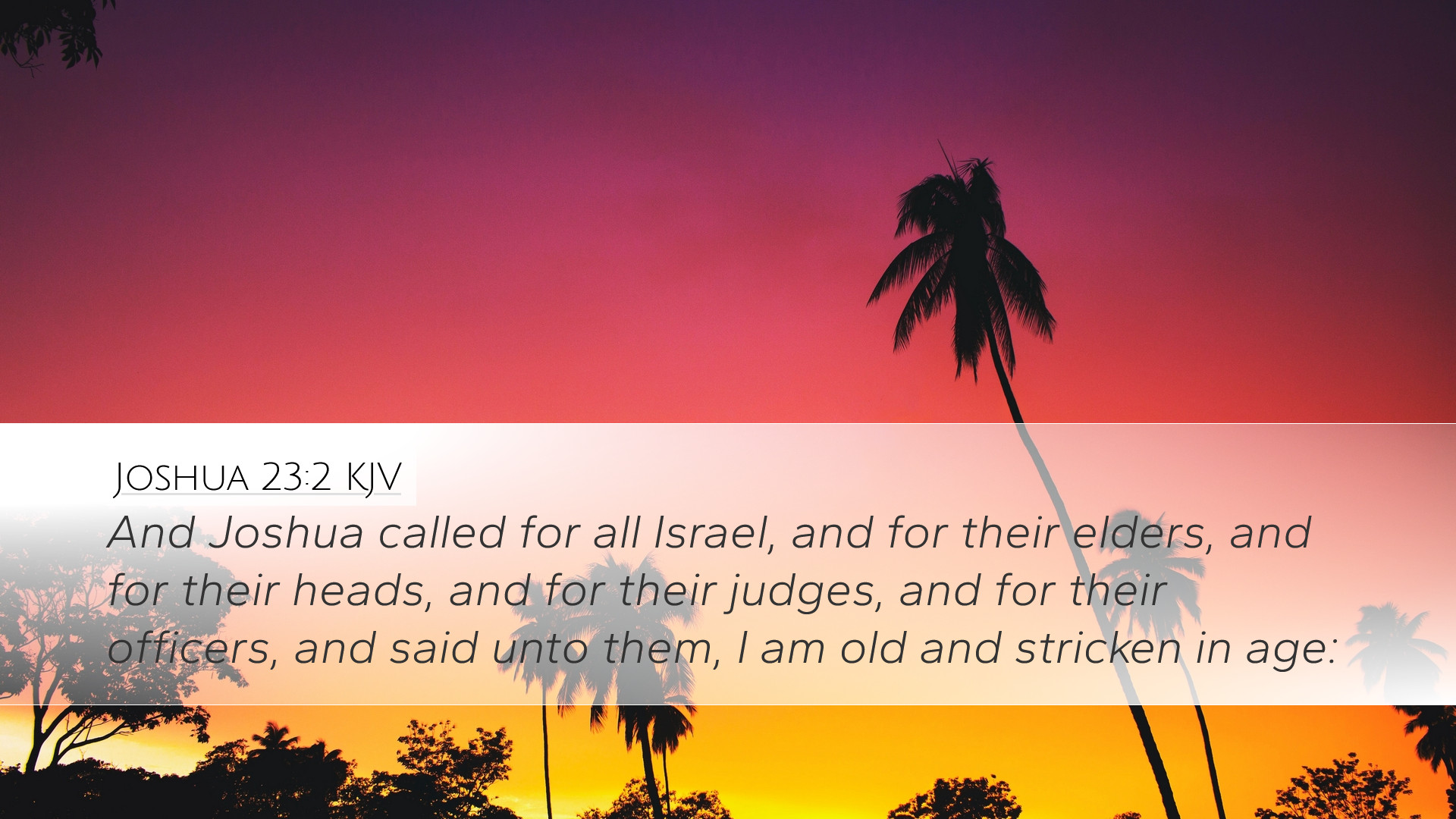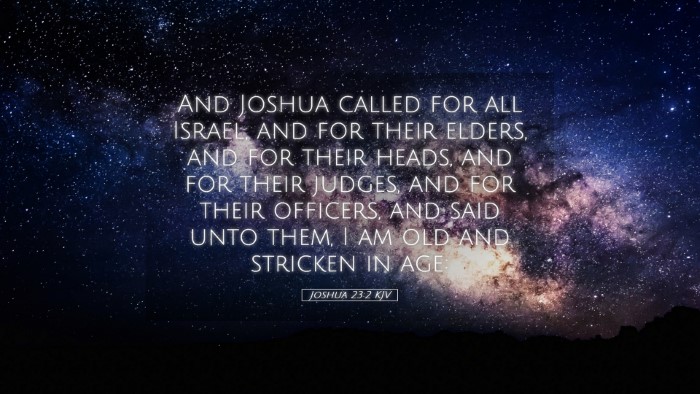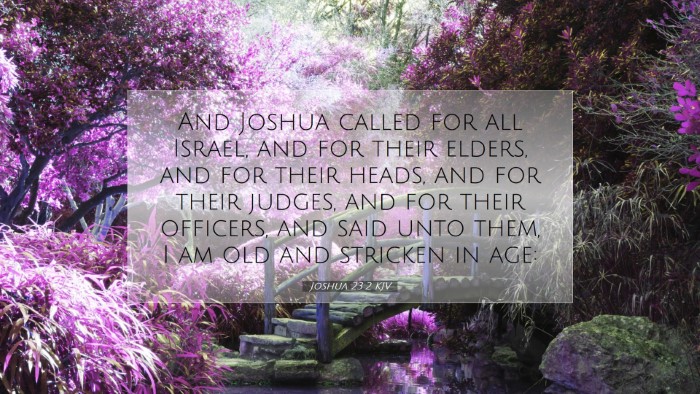Old Testament
Genesis Exodus Leviticus Numbers Deuteronomy Joshua Judges Ruth 1 Samuel 2 Samuel 1 Kings 2 Kings 1 Chronicles 2 Chronicles Ezra Nehemiah Esther Job Psalms Proverbs Ecclesiastes Song of Solomon Isaiah Jeremiah Lamentations Ezekiel Daniel Hosea Joel Amos Obadiah Jonah Micah Nahum Habakkuk Zephaniah Haggai Zechariah MalachiJoshua 23:2
Joshua 23:2 KJV
And Joshua called for all Israel, and for their elders, and for their heads, and for their judges, and for their officers, and said unto them, I am old and stricken in age:
Joshua 23:2 Bible Commentary
Bible Commentary on Joshua 23:2
Bible Verse: "And Joshua called for all Israel, and for their elders, and for their heads, and for their judges, and for their officers, and said unto them; I am old and stricken in age."
Introduction
Joshua 23:2 is a significant verse in the book of Joshua, marking a critical moment in Israel's history. It represents the closing chapter of Joshua’s leadership and the passing of the mantle to the next generation. This commentary combines insights from notable public domain commentators to explore the depth of this verse, its context, and its application for contemporary readers.
Context and Significance
The context of Joshua 23 occurs after Israel has conquered much of the Promised Land. As Joshua prepares to address the leaders and people, he is acutely aware of the changes that may come with his impending departure from leadership. The verse sets the stage for Joshua’s farewell address, which carries weight not just because of his age, but because of his accumulated wisdom and experience.
Matthew Henry notes that Joshua, having reached an advanced age, recognizes his role in instilling faithfulness in the people of Israel is of utmost importance. This meeting underscores the importance of leadership transitions and the need for continuous commitment to God's covenant.
Assembly of Leaders
Joshua’s call to all Israel and their leaders is deliberate. He gathers elders, heads, judges, and officers, indicating a system of governance that is comprehensive and representative. This assembly serves multiple purposes:
- Unity: Strengthening the bond among leaders and the community.
- Transition of Leadership: Preparing the nation for a period without Joshua’s direct leadership.
- Reinforcement of Covenant: Reminding leaders of their responsibilities concerning God’s laws and promises.
Albert Barnes provides insights on the importance of the elders and judges, emphasizing their roles in maintaining the spiritual and moral fabric of the nation, a crucial aspect as they move into a future that may challenge their commitment to God.
The Reflection of Age and Experience
Joshua's declaration of being "old and stricken in age" brings forward themes of wisdom and the burdens of leadership. In biblical literature, age is often associated with experience and understanding. This recognition can serve as a teaching moment for the leaders present, as Joshua's years reflect his faithfulness and dedication to God.
Adam Clarke elaborates on the significance of Joshua's acknowledgment of his age, tying it to the natural cycle of leadership and life. He reminds us that with age comes the responsibility of passing down wisdom and ensuring that the next generation remains steadfast in their commitments to God.
The Importance of Remembrance
It is essential for the assembly that follows Joshua's introduction to remember the collective journey they have undertaken. Joshua’s emphasis on his personal aging serves as a poignant reminder that time spent in fellowship with God and in obedience to His commands should continually be reflected upon.
- Lessons of the Past: Joshua is tasked with reminding Israel of their victories and the faithfulness of God.
- Observance of God's Laws: There is an urgency in Joshua's message that echoes the necessity of faithfulness to God's commands.
- Vision for the Future: Joshua's address is not only a reflection on the past but also a vision for maintaining spiritual fortitude moving forward.
Exhortation to Faithfulness
In the verses that follow (Joshua 23:3-6), Joshua exhorts the leaders and the people to be faithful to God. His experience and authority serve to strengthen the call to continue in the ways of the Lord. Joshua’s reminder that he has walked with God provides a powerful testament to the importance of personal faith as a model for collective behavior.
Henry highlights that true leadership in faith requires not only personal piety but also the ability to inspire and motivate the community to pursue righteousness actively. Joshua’s age becomes a platform from which he can propel the nation towards faithfulness as they face new territories and challenges.
Conclusion and Applications
Joshua 23:2 serves as a poignant reminder of the cycles of leadership, the importance of memorializing God’s faithfulness, and the duty to instruct future generations. For pastors, students, theologians, and Bible scholars, the verse encapsulates crucial lessons on leadership, unity, and unwavering faith amidst change.
As we reflect on the implications of this text, we are reminded:
- Leadership Requires Responsibility: The need for leaders to guide and instruct those they lead.
- Faithfulness in Transition: Understanding that transitions in leadership require a continual commitment to God’s promises.
- The Enduring Value of Experience: Recognizing that the wisdom of elders should shape the trajectory of the faithful community.
In summary, Joshua 23:2 stands as a profound moment in history that emphasizes the intertwined nature of leadership, age, faithfulness, and the mission of God's people.


